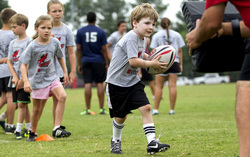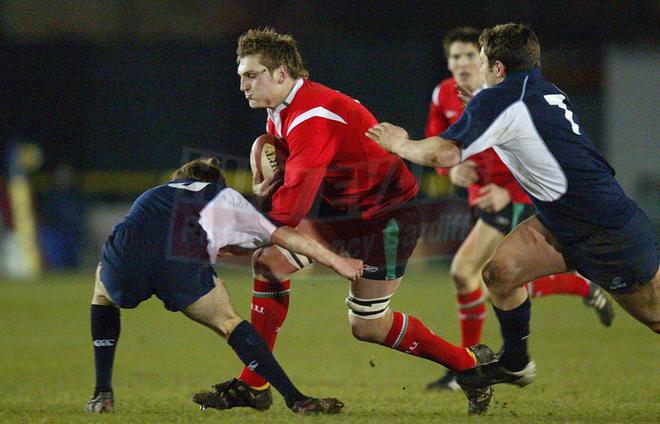 Is rugby a safe for American Youth? by Lyle J. Micheli, MD Commentary by a past president of the American College of Sports Medicine I support efforts to establish rugby teams in American high schools and colleges, and wish to alleviate any possible concerns about the sport’s relative safety. I think I offer a unique perspective on the subject given that:
A popular sport worldwide Rugby is a dynamic contact sport that is played all over the world by men and women of all different classes,creeds, and races. It fosters friendship and camaraderie between players. To celebrate one recent Christmas, men from the American and New Zealand research stations in Antarctica played a game of rugby against each other on those southernmost frozen wastelands. Most rugby players have played with and against people from other nations. Rugby is played in over 100 countries and is the most popular team sport in nations such as Japan, Fiji, and Wales. This sport could not be as popular as it is among the peoples of so many different cultures if it were dangerous! In fact, the risk of injury in rugby is relatively low compared to sports Americans embrace – such as football, ice hockey, and lacrosse – a fact borne-out by numerous studies to ascertain the risk of sports injury in different activities. The reasons for this are quite straightforward to those of us who study sports medicine. IRB Player Numbers_infographic Why rugby is a safe sport – paradoxically The main reason rugby players have a relatively low risk of injury compared to football players is paradoxical –rugby players don’t wear protective equipment. Thus the rugby player doesn’t have the same disregard for the safety of his or her head, neck, and shoulders when tackling or trying to break through a tackle. The other reason is that unlike football, rugby is a game of possession, not yardage. Consequently rugby players don’t tackle by “driving through the numbers,” as football players are taught to do with their heads when tackling a player. In rugby, players are taught to use their arms to wrap a player’s legs and let the momentum of that player cause him to go to ground. Furthermore, in rugby there is no blocking, and so players who don’t have the ball don’t get hit when they’re not expecting it. One of the reasons rugby has a reputation for being “dangerous” in the United States is because when the average American sees rugby being played, he or she sees a free-flowing contact sport. Because it doesn’t have the familiar stop-and-start character of football and other TV-shaped sports, to the uninitiated rugby can appear confusing and “scary.” Furthermore, while the bumps, bruises, and scrapes you see on the elbows, knees, and faces of many rugby players can appear alarming, they are of considerably less concern than the anterior cruciate ligament ruptures, finger fractures and dislocations, and chest contusions characteristic of a sport such as football in which heavy protective equipment is worn. Injury rates I performed one of the first studies of rugby injuries in the United States, which showed that compared to football, the incidence of injury in rugby is quite low (10 percent in American club rugby compared to 52 percent in NCAA college football). My study was published in the peer-reviewed American Journal of Sports Medicine. Subsequent studies have supported my results. It would be disingenuous to suggest that rugby players never get injured. However, based on the numerous studies that have been done, the scientific conclusion we must reach is that rugby is not as injurious as certain other contact and collision sports that most of us believe deserve NCAA status, and is a relatively safe sport in the panoply of athletic endeavors available to our young men and women. Since the early study I did, sports medicine has grown as a specialty and there has emerged a considerable body of literature on the safety of all sports, including rugby. If you review the literature you will find no evidence to suggest that rugby should be denied a legitimate place in high schools and colleges around the world. For all the reasons outlined above, I have no hesitation based on my personal and professional experience to declare that rugby is worthy of a place in American colleges and high schools. Dr. Lyle Micheli is director of the Division of Sports Medicine at Boston Children’s Hospital and an Associate Clinical Professor of Orthopaedic Surgery at Harvard Medical School. He is a past president of the American College of Sports Medicine and currently serves as chairman of the Massachusetts Governor’s Council on Physical Fitness and Sports. Dr. Micheli is chairman of USA Rugby’s Medical & Risk Management Committee. Friday we had a match against Raleigh; we went out and played hard. The game plan in the first half put a lot of pressure on Raleigh. Please remind your players that a vast majority of our side are freshman playing against teams that have a heavy influence of seniors. We went down to 14 men within 2 minutes and then down to 13 at the 20 minute mark. We played the majority of the game with 3 or 4 players off the field while our opponents maintained 15 players. The score at 10 minutes into the second half was 23-5. Most of the scores were basic errors that we will
adjust accordingly for future games. However I heard many great compliments about your impressive skills, especially great tackling and defense. We look forward to seeing everyone on Tuesday. Good luck to those teammates trying out for the All-Stars State team.  Craig Everett. Cardiff v Llanelli I am pleased to announce that Craig Everett will be one of our guest coaches. Craig is still an active player with Merthyr. He has also represented Wales at U21, played professionally for Cardiff, Carmarthen Quins, Aberafan, Scarlett’s and Worcester Warriors. He is a back row forward who will complement greatly the coaching staff. In addition to being an active player, he is also a Welsh Rugby Development officer, responsible for the development of the players and the game for the Welsh Rugby Union. |
AuthorWrite something about yourself. No need to be fancy, just an overview. Archives
May 2024
Categories
All
|
Web Hosting by Bluehost



 RSS Feed
RSS Feed